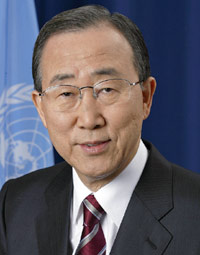U.N. Secretary-General Ban Ki-moon is expected to arrive in Burma this weekend for a visit of several days, with discussions focused on how the United Nations can help Burma in it transition to a more democratic country.
 “Myanmar is only at the beginning of its transition and many challenges lie ahead, many concerns have yet to be addressed yet I am convinced that we have an unprecedented opportunity to help the country advance towards a better future,” said Ban.
“Myanmar is only at the beginning of its transition and many challenges lie ahead, many concerns have yet to be addressed yet I am convinced that we have an unprecedented opportunity to help the country advance towards a better future,” said Ban.
Ban, who said, “Burma is reopening to the world,” spoke after a meeting of his Group of Friends on Myanmar, which he called “very productive.” He last visited Burma in 2009.
Observers said high on the list of topics to be discussed would be the plight of ethnic refugees in border areas. The U.N.’s Rangoon office was recently allowed to distribute food and aid to refugees in Kachin State, where as many as 50,000 refugees may be displaced because of recent fighting.
Ban will arrive after visits to Delhi and Mumbai. It will be his third trip to the country since he began his tenure as secretary-general.
“We have seen encouraging political and economic reforms over the past year and a half – the recent elections were a landmark,” he said.
He said he planned to personally congratulate reformist President Thein Sein and opposition leader Aung San Suu Kyi on their work to help the country with reconciliation, reform, and development.
“Working together they have come far, working together I am confident they will go further still and together we will explore many tangible and practical ways in which the U.N. can help,” he said.
Ban said helping countries in transition is an important part of his second term as the U.N. chief.
“In Myanmar we have an opportunity and a responsibility to do that," he said. "We must make the most of this moment.”
Ban welcomed suspension of sanctions leveled against Burma by the European Union and similar actions taken by other countries including the U.S. The European Union announced on Monday that it was suspending most sanctions against Burma for a year. The temporary suspension gives the 27-member bloc leverage to pressure the Burmese government to adopt more reforms.
British Foreign Secretary William Hague said on Monday that Burma has made “great progress,” but he noted ongoing human rights issues, including political prisoners and fighting in Kachin state.
EU foreign policy chief Catherine Ashton said she will travel to Burma later this week to meet with Burmese officials and also to open a European Union office.


